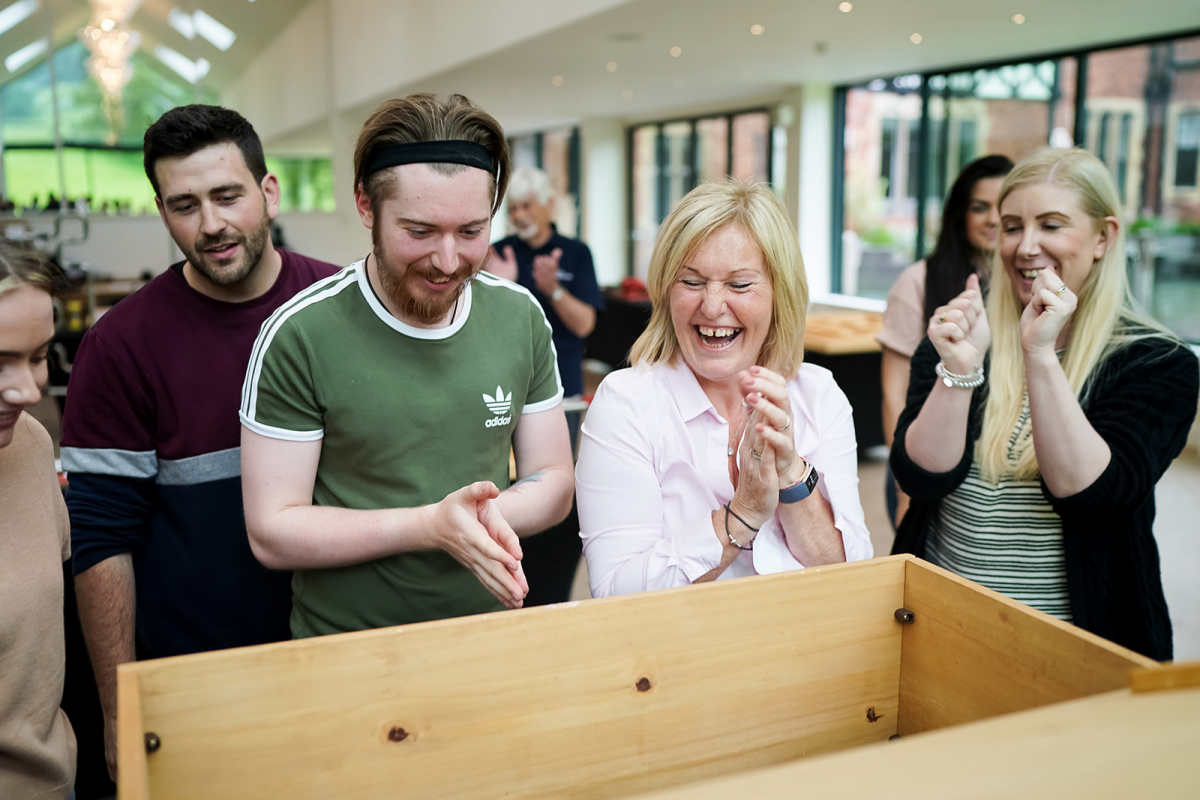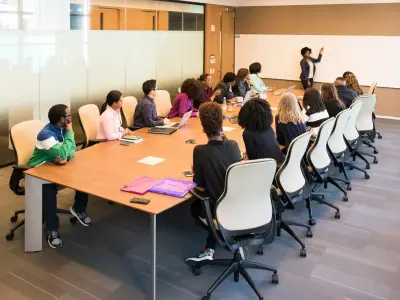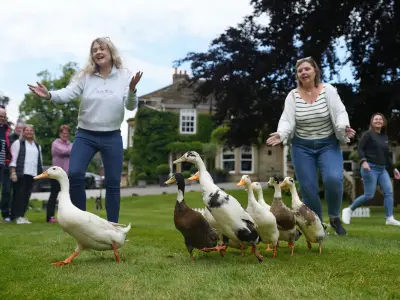
Meeting and event planners often have the difficult task of bringing together a diverse audience of attendees from different age groups, backgrounds, and cultural perspectives. With the current workforce spanning up to five generations - Traditionalists, Baby Boomers, Generation X, Millennials and Gen Z - the challenge of catering to everyone's needs and preferences can be overwhelming.
However, with the right strategies and approaches, meeting and event planners can conquer the generational divide and create events that are inclusive, engaging, and memorable for all attendees. By understanding the purpose and objectives of the event, conducting audience research, offering a variety of activities and sessions, utilising technology, and fostering a sense of community among attendees, event planners can ensure that all attendees have an enjoyable and enriching experience.
If your aim is to organise an engaging event that fosters a sense of community and collaboration amongst delegates from different generations, this article by our Co-Founder & Event Director Ben Maddock is for you! We'll explore the strategies and approaches that event planners can use to overcome the generational divide and create inclusive and engaging experiences for all attendees.
Gildas Poirel and Dr Michela Coppola writing for Deloitte argue that "to maintain productivity and innovation, organisations must persuade employees of different ages and backgrounds to collaborate. This demands an ability to identify the skills and strengths of individuals, recognise how they can contribute and understand how to engage with them."
Mixing generations at business events, conferences and meetings has a number of benefits, including sharing knowledge and experiences between different age groups. By embracing the diversity of your audience and capitalising on the strengths of each generation, event planners can create a truly inclusive and engaging experience for all attendees.
Younger attendees are often more tech-savvy, having grown up in a world that is increasingly digital and connected. By mixing them with older attendees, they can impart their technical expertise and help others to become more comfortable with technology. On the other hand, older attendees are often more experienced in business, having worked in a variety of industries and environments. They can share their wealth of knowledge and help to impart a sense of wisdom and perspective to younger attendees.
"The future of events lies in bridging the gap between generations. By embracing diversity and encouraging intergenerational interaction, we can create a more connected and collaborative event atmosphere."
As event organisers, it is crucial to plan ahead to create events that are inclusive, engaging, and memorable for all attendees. One of the key components of a successful event is understanding the needs and preferences of your audience. This is particularly important when dealing with attendees from multiple generations.
The size of your event and how well you know the team involved will most likely determine how much research you’ll need to undertake to understand your audience. For larger events or when working with teams you don’t know as well, here are some steps you can take to gather information about your audience:
Define Your Objectives: A clear understanding of the event's purpose and objectives can help planners tailor the content and activities to the specific needs and interests of the target audience. Are you looking to bring various teams together, introduce a new product or plan your objectives for the year ahead? By understanding your aims and by taking into account the preferences, learning styles and abilities of your delegates, meeting organisers can help bridge the gap between different generations and create a more cohesive and unified atmosphere.
Survey your attendees: One of the most straightforward ways to gather information about your attendees is to conduct a survey. You can send out an email or an online survey to all of your attendees, asking about their interests, preferences and goals for the event. This information will help you to tailor the content, activities, and sessions to their needs and objectives.
Analyse your data: Another way to gather information about your attendees is to analyse data you already have. This can include demographic information, such as age, gender, and job role, as well as previous attendance records and feedback from past events. This information will give you a better understanding of who your delegates are and what they may interested in.
Speak to your team: You can also engage with your teams directly, either through direct communication or via department heads. Ask them what they want to see at the event, what topics they're interested in, and what activities they prefer. This will give you valuable insights into their needs and expectations and help you to create a more engaging experience.

"When it comes to events, it's not just about bringing people together, it's about fostering relationships and creating a sense of community across generations."
If you want your team to build relationships and break down the generational divide, make sure you create opportunities for attendees to interact with each other, form connections, and share their experiences and insights. Andrea Boatman writing for the Acadamy to Innovate HR states that the "key is to communicate openly, honestly, and transparently to build an atmosphere where people feel included and respected. This provides a positive employee experience and enables individuals to fulfill their professional needs and potential."
Some practical ways to do this are to:
Plan Team Building Activities: Team building activities are an excellent way to bring attendees from different generations together and foster collaboration and teamwork. To ensure that all attendees feel included and valued, it's important to choose activities that are inclusive and cater to all abilities. This means avoiding physical challenges that may not be suitable for everyone, and instead, focusing on activities that allow all participants to take part and excel. Events made Simple we have a range of inclusive team-building activities that are focused on communication, problem-solving and creativity. Perfect for bringing people together and encouraging collaboration.
Think About Seating Plans: Seating arrangements can be a crucial factor in bridging the generational gap during meetings and events. Instead of segregating attendees based on age, it can be hugely beneficial to mix different generations, teams and departments at the event. This approach encourages attendees to interact and engage with each other, promoting connections and relationships that can help break down the divide. For instance, using round tables or randomized seating can foster a more inclusive and collaborative environment.
Organise Breakout Sessions: Breakout sessions are an excellent way to cater to the interests and preferences of different generations. By offering a variety of sessions that cover different topics and cater to different learning styles, event planners can ensure that all attendees feel engaged and valued. For example, offering both interactive, hands-on sessions and more traditional lecture-style presentations during an event can help ensure that all attendees can engage with your content no matter their background or previous experiences.
Technology has revolutionised the way we communicate and interact with each other. Event planners can leverage these tools to help bring people from different generations together. Use of digital tools such as apps and social media can help attendees at larger events connect, engage, and share their experiences in real-time. However, there are a few things to bear in mind when using technology.
Ease of Use: if you want to avoid a tech failure or a scramble of delegates looking to download an app half way through your presentation, then make sure you choose a tool or app that is easy to use. We’d also recommend that meeting organisers provide guidance and information about how to download and access any technology or apps ahead of time to ensure that all attendees can make use of the tech available on the day.
Get the Balance Right: Balancing the use of technology with engaging face-to-face interaction is essential if you want to get the most from your event. Whilst apps and tools can enable delegates to interact with presenters in real time, it’s also important to encourage attendees to disconnect from their devices and participate in hands-on activities to make the most of your time together.
Meeting and event planners have a unique opportunity to bring people from different generations together and create a more inclusive and engaging experience for everyone. By conducting audience research, offering a variety of activities and sessions, utilising technology, and fostering a sense of community, meeting organisers can conquer the generational divide and create events that are memorable and impactful for all attendees.
Alternatively, if you want to get started and plan an event or conference quickly or easily, why not use our costs calculator to get an instant quote and create a shortlist of suitable venues.
Whilst its important to note that every individual will be different, and therefore it's best to avoid sweeping generalisations based on thier age, we thought it may be useful to share some FAQs about the five generations you may find useful when thinking about age based diversity.
What is the Traditionalist Generation? The Traditionalist Generation, also known as the Silent Generation, was born between 1925-1945. They are known for their strong work ethic, sense of duty and loyalty, and traditional values.
What is the Baby Boomer generation? The Baby Boomer generation was born between 1946-1964. They are known for their optimism, idealism, and resistance to change. They are often considered to be the "me" generation, as they were the first to grow up in an era of affluence and prosperity.
What is the Gen X generation? Generation X was born between 1965-1980. They are known for their independent, resourceful, and practical nature. They are often considered the "lost" generation, as they grew up in between the Baby Boomers and Millennials.
What is the Millennial generation? The Millennial generation, also known as Generation Y, was born between 1981-1996. They are known for their tech-savvy, inclusive, and socially conscious nature. They are often considered the "entitled" generation due to their high expectations for success and recognition.
What is the Gen Z generation? The Gen Z generation, also known as the iGeneration, was born between 1997-2012. They are known for their tech-native, diverse, and entrepreneurial nature. They are often considered the "post-millennial" generation and are the first to grow up in the era of social media and digital communication.
How do the different generations communicate differently? Traditionalists tend to communicate more formally and rely on face-to-face interactions. Baby Boomers are more likely to communicate through phone calls and email. Generation X prefers a balance of face-to-face and digital communication. Millennials are more likely to communicate through social media and instant messaging. Gen Z prefers visual and digital forms of communication, such as short videos and emojis.
How do the different generations approach work and career? Traditionalists value stability and job security, and are more likely to stay with one employer for their entire career. Baby Boomers value achievement and recognition, and are often motivated by success and material rewards. Generation X values flexibility and work-life balance, and are more likely to seek out opportunities for growth and development. Millennials value purpose and meaning in their work, and are often driven by a desire to make a positive impact on the world. Gen Z values innovation and entrepreneurship, and are more likely to pursue their own start-up or freelancing opportunities.

2nd September, 2024
Meetings and conferences are both gatherings of people with a shared purpose - normally that of sharing or disseminating information. However, they serve distinct roles…

18th November, 2024
Duck Herding is one of our most in demand team building activities . It provides an innovative way to build teamwork and improve communication skills (and is also a LO…

20th January, 2025
When attending a corporate event, how you present yourself matters more than you might think. Your attire, behavior, and interactions can shape how others perceive you a…